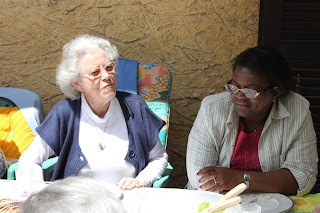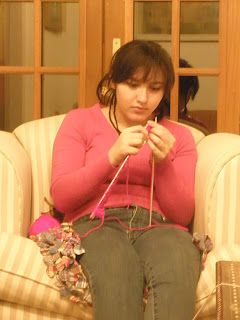Sunday, June 26, 2011
Friday, June 17, 2011
Wednesday, June 8, 2011
Omeed-e-Kodak lunch
A lovely lunch was prepared for the people helping the cause of Omeed-e-Kodak.
We would like to thank them again and thank any future contributors.
We would like to thank them again and thank any future contributors.
Tuesday, June 7, 2011
Instructions for one sweater
Need about 100 grams of yarn (two rolls), the needles size 3,5 or 4.
Cast on 70 stitches and knit 2 two purl and 2 knit stitches for 22 cm. Then knit 4 cm so that the 22 stitches in the middle continue as before (2/2) but 24 stitches on both sides are knitted only knit stitches ( no purl). Then make the square hole in the middle by terminating the 22 stitches in the centre and continuing both sides separately for 6 cm. Then re-cast on the centre and continue again 4 cm by 2/2 with 22 in the centre and 24 on both sides as knit only. Then make all 2/2 and knit 22 cm more before terminating. It is in the end one long piece (about 58 cm) with the square hole in the centre. Fold it and stitch the sides and leave the openings for the sleeves.
Here are pictures of sweaters that have already been knitted:
Here are pictures of sweaters that have already been knitted:
HOPE FOR BABIES, TAKING KNITTING TO NEW HEIGHTS!

 Look! Two women knitting baby sweaters at 2362 m altitude, on the terrace of an Alpine restaurant, in the brilliant sunshine, surrounded by skiers from around the world.
Look! Two women knitting baby sweaters at 2362 m altitude, on the terrace of an Alpine restaurant, in the brilliant sunshine, surrounded by skiers from around the world.
Why are they doing this? “We are part of the HOPE team in the World Health Organization and we are passionate about improving the health of women and babies, especially in Afghanistan”, explains Dr. Heli Bathija, originally from Finland, working in the WHO Department of Reproductive Health and Research (RHR). “While the HOPE team, an informal network of colleagues with desire to support WHO Staff to have harmony and health in their families and at work, has been organizing different lunchtime discussions about topics relating to work and family life and bus trips to WHO Staff, families and friends, with about 600 persons participating since 2009, we started two weeks ago a knitting club in solidarity with women in Afghanistan, making sweaters for newborn babies”, adds Dr. Deborah Kioy, originally from Kenya, from the WHO Department of Tropical Diseases (TDR). “We carry our knitting work nowadays everywhere, like today when we came to inspect the place for the next HOPE team weekend excursion, we were knitting in the train, in the bus and now at the ski station!” they explain enthusiastically. Heli is the one who had the idea of the knitting project and Deborah is the one who hosted the first meeting of the knitting club on 19 January 2011. While there were only three participants (Chrissie Chitsulo from Malawi, working in the Department of Knowledge Management Systems (KMS) was the third one) in the first meeting, the crowd is increasing rapidly.The word is spreading: it is fun to spend time in knitting with others, it is creative when one can choose colours and patterns, it feels good to be able to help concretely! The group has also attracted some young participants, including a young man, a former WHO intern, who had never knitted before. Now they are building their own capacity with speed: 17 years old Amna Noori from Afghanistan, who just learned how to knit through this club, is already teaching newcomers! even the knitting club of Grand-Saconnex, mostly grandmothers, have joined the project!”
Heli developed the idea of the “Omeedeteflana” (means “Hope of the babies” in dari, one of the official languages of Afghanistan) inspired by a project of another Finnish woman, Pirkko Tuppurainen, who works in Ethiopia in collaboration with the Black Lion Hospital in Addis Ababa and who has designed the basic model for the baby sweater. The model is practical and simple. It takes 5-6 hours from an experienced knitter like Heli and Deborah to make one, and a good thing is that one does not have to finish it in one go (who would have time for that?) but one can knit for a few minutes at a time, whenever, wherever!
While the people in Geneva are knitting these baby sweaters for fun, there are also women’s groups in Afghanistan who will be knitting in order to get some income. The idea is that those in Geneva who want to contribute to the project without knitting can “Adopt a sweater” and donate money which will be used for providing yarn and knitting needles for the Afghan women who will be knitting sweaters, and who will also be able to sell these sweaters for the participating hospitals. Indeed, to the maternity clinics, because the sweaters will be offered as a gift to any woman who attends antenatal care and deliver the baby with a skilled birth attendant. The Afghan end of the project is being handled by the WHO office in Kabul. The plan is to include also a possibility for the knitters in Geneva to receive photos of babies with the new sweaters.
Heli explains: “Maternal and newborn mortality and morbidity are high in Afghanistan. Efforts are now underway by the Afghan Government, supported by international organizations and donor agencies to improve the situation through jointly planned, funded and executed activities ranging from policies and strategies revisions to training of health personnel and strengthening both overall infrastructure (education, water and sanitation, etc.) and the health systems. While these plans are being currently prepared, it is recognized it would be highly beneficial to involve ordinary women in practical ways in these activities. Many agencies are supporting community involvement work and many are also supporting small scale income generating activities for women. However, to our knowledge, the products of these projects are often meant for outsiders (i.e. weaving carpets and embroidering table clothes or shirts to be sold to expatriates) and not to the local population that would need them. This “Omeed-eteflana” project will be directly beneficial to the newborn babies, since one of the critical issues for the newborn survival (especially for the premature or low birth weight) is the body temperature control. ”
Deborah and Heli want to highlight the spiritual aspect of the project: “God has given life to these babies, therefore we in solidarity, also feeling blessed abundantly, want in our small way to give hope to them and to their mothers for a better future!” The first badge of sweaters has already reached Kabul for the joy of the mothers and babies”.
Subscribe to:
Posts (Atom)















































